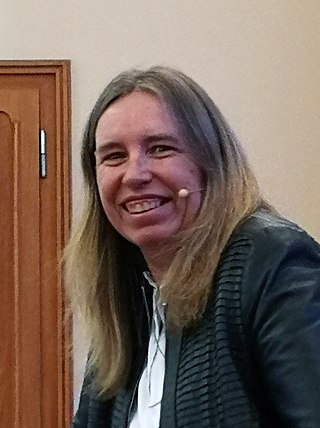
T-Mobile is the brand name used by some of the mobile communications subsidiaries of the German telecommunications company Deutsche Telekom AG in the Czech Republic, Poland and the United States.
Very high-speed digital subscriber line (VDSL) and very high-speed digital subscriber line 2 (VDSL2) are digital subscriber line (DSL) technologies providing data transmission faster than the earlier standards of asymmetric digital subscriber line (ADSL) G.992.1, G.992.3 (ADSL2) and G.992.5 (ADSL2+).

Deutsche Telekom AG is a German telecommunications company headquartered in Bonn and is the largest telecommunications provider in Europe by revenue. It was formed in 1995 when Deutsche Bundespost, a state monopoly at the time, was privatized. Since then, Deutsche Telekom has consistently featured among FortuneMagazine's top Global 500 companies by revenue, with its ranking as of 2023 at number 79. In 2023, the company was ranked 41st in the Forbes Global 2000. The company operates several subsidiaries worldwide, including the mobile communications brand T-Mobile. It is the world's fifth-largest telecommunications company by revenue.

Technische Universität Berlin is a public research university located in Berlin, Germany. It was the first German university to adopt the name "Technische Universität".

The Deutsche Bundespost was a German state-run postal service and telecommunications business founded in 1947. It was initially the second largest federal employer during its time. After staff reductions in the 1980s, the staff was reduced to roughly 543,200 employees in 1985. The corporation was dissolved in 1995 under two rounds of postal reforms that took place in the German Post Office in 1989 and 1995, respectively. Following the reforms, the former Deutsche Bundespost was broken into three publicly traded corporations: Deutsche Post AG, Deutsche Telekom, and Deutsche Postbank AG.
TINA-C stands for Telecommunication Information Networking Architecture Consortium. It was an attempt by several actors in the telecommunication world to define, design and realize a software architecture for the telecommunication infrastructure. The consortium has defined a number of specifications and has organized several experiments and demos.

The Berlin-Brandenburg capital region is one of the most prolific centers of higher education and research in the world. It is the largest concentration of universities and colleges in Germany. The city has four public research universities and 27 private, professional and technical colleges (Hochschulen), offering a wide range of disciplines. Access to the German university system is tuition free.

The German Research Center for Artificial Intelligence, DFKI was founded in 1988 as a non-profit public-private partnership. It has research facilities in Kaiserslautern, Saarbrücken, Bremen, Oldenburg, and Osnabrück, laboratories in Berlin, Darmstadt, and Lübeck, and a branch office in Trier. In the field of innovative commercial software technology using artificial intelligence, DFKI is the leading research center in Germany.
Former education and research institution in Lugano, Switzerland, part of Università della Svizzera italiana

Makedonski Telekom AD is a telecommunications company in North Macedonia with headquarters in Skopje. It is part of the Magyar Telekom Group, which is a fully consolidated subsidiary of international Deutsche Telekom Group. It offers a range of telecommunications and entertainment services, such as telephone services, a range of internet access services including broadband internet, entertainment IPTV products and operates the national telephone network.

The CBS International Business School (CBS) is a state-recognised, private business school which emerged in 2020 from the individual brands Cologne Business School (CBS) and European Management School (EMS). At its locations in Cologne, Mainz, Potsdam, Aachen, Brühl, Neuss and Solingen, it offers approximately 3,000 students its predominantly English-language business management study courses with the academic degrees Bachelor of Arts, Bachelor of Science, Master of Arts, Master of Science and MBA. The CBS Cologne Business School GmbH is the responsible body of the university.

Anja Feldmann is a German computer scientist.

Gesche Joost is a German design researcher.
Sebastian Möller is an expert for quality of experience and speech technology.
Alexander Raake is a professor heading the Audiovisual Technology Group at Technische Universität Ilmenau since 2015.

José Luis Moreira da Encarnação is a Portuguese computer scientist, Professor Emeritus at the Department of Computer Science of the Technische Universität Darmstadt in Germany and a senior technology and innovation advisor to governments, multinational companies, research institutions and organizations, and foundations. He is involved in the development of research agendas and innovation strategies for socio-economic development with a focus on emerging economies. He is also a member of the Topical Network Information and Communication Technology (ICT) and ICT-related activities of the German National Academy of Science and Engineering (acatech) and the German Berlin-Brandenburg Academy of Sciences and Humanities (BBAW). He is an elected member of the ACM SIGGRAPH Academy (USA).
Klaus-Robert Müller is a German computer scientist and physicist, most noted for his work in machine learning and brain–computer interfaces.
Ralf Steinmetz is a German computer scientist and electrical engineer. He is professor of multimedia communication at the Technische Universität Darmstadt.

Matthias Scheffler is a German theoretical physicist whose research focuses on condensed matter theory, materials science, and artificial intelligence. He is particularly known for his contributions to density-functional theory and many-electron quantum mechanics and for his development of multiscale approaches. In the latter, he combines electronic-structure theory with thermodynamics and statistical mechanics, and also employs numerical methods from engineering. As summarized by his appeal "Get Real!" he introduced environmental factors into ab initio calculations. In recent years, he has increasingly focused on data-centric scientific concepts and methods and on the goal that materials-science data must become "Findable and Artificial Intelligence Ready".

Barbara van Schewick is a computer scientist and law professor at Stanford Law School. She is widely recognized as a leading expert on net neutrality and the economic and social implications of internet regulation.












